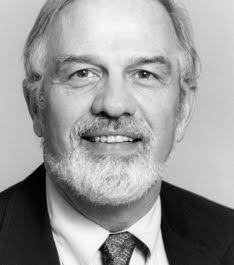From the Writers House in the Department of English to literary art magazines and the opportunity to minor in creative writing, poetry thrives on Case Western Reserve University’s campus. April is National Poetry Month, and The Daily is putting the spotlight on members of the university community who are passionate about expressing themselves through poetry.

Today we’re featuring Robert Lawry, emeritus professor of law. Born and raised in Pittsburgh, Lawry holds degrees from Fordham University, the University of Pennsylvania and Oxford University. He practiced law in his hometown before becoming a fellow in law and the humanities at Harvard University. He then went on to have a 36-year academic career at Case Western Reserve University School of Law.
Though an expert in law, Lawry said poetry has provided him with consolation, inspiration and pleasure over the years. He’s published three books of poetry as well as poems in various magazines, including The New Orleans Review, The Kent State Quarterly and other publications.
1. Can you share one of the poems you’ve written and talk a bit about it—what inspired it?
Definition of God
I witness from a midnight attic window
spring snow like leaping elves about the sky.
They drop in damask parachutes and go
down in a heap, monolithic to the eye.
Within the matter is all Plato, wise
Socrates in dialogue: just who is right
concerning God? Confused, my mind and eyes
split disparate ways. My thoughts are not my sight.
Immersed in books, I suddenly see dawn
outside where snow has gathered on the ground;
like Rip Van Winkle lying on the lawn
I cannot think with thinkers too profound.
The true sage is the morning at her show
and Plato’s silence: God is elves in snow.
________
One night I was reading a book, titled Philosophers Speak of God, both interested and a little annoyed by the abstractions. A walk to the window disclosed an April snowstorm, and an odd vision, which came from who knows where.
2. Where do you draw inspiration in general?
Inspiration comes from anything that might arrest my attention, from a newspaper story to a phrase from somebody’s lips. The process usually starts with a line or phrase that sings in my ear. Then, the work begins, which is both technical (is this going to be a sonnet? as the poem above turned out to be), and where is the language/meaning taking me?
3. Who are some of your favorite poets and why?
I have many favorite poets. Robert Frost and Gerard Manly Hopkins (to name but two) I constantly re-read. Both used the resources of the traditions very differently, but both seemed to aspire to do what Frost said was true of his own work—that it began in delight and, like ice, melted on its own riding into some kind of wisdom, not the kind that caused revolutions, but maybe a temporary stay against confusion.
4. When did you first get started doing poetry?
I scribbled a bit in college, as an English major, imitating T. S. Eliot (badly), but found my way in my early 30s after the opportunity to learn from Robert Fitzgerald arose quite unexpectedly. He taught me about all the resources of the tradition. I’m still learning.
5. Why do you love poetry? Why should others?
I love poetry for the sounds in the sense of the very best of poems. It is both music and has a special, one-of-a-kind meaning to me. A great poem can be read and reread forever, as one never tires of hearing the same piece of music by Mozart or Beethoven.
